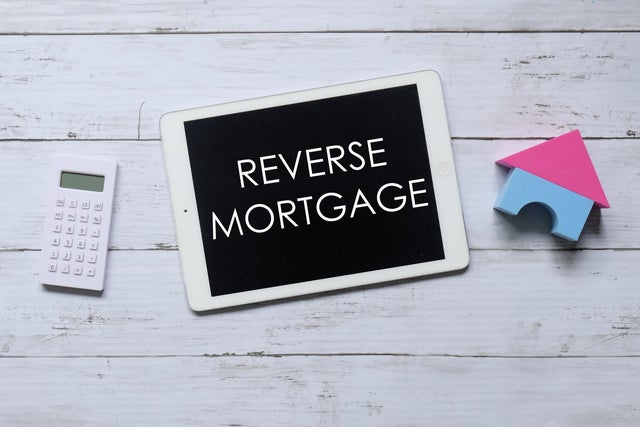Single-purpose reverse mortgage: What it is, how it works and what to consider before borrowing
For many older homeowners, years of steady mortgage payments and climbing home values have resulted in a significant amount of home equity. Right now, for example, the average homeowner has well over $300,000 worth of home equity to tap into, and many senior homeowners have even more equity available to them. But while tapping your home equity can be an affordable way to borrow money in today's high-rate environment, that high amount of home equity doesn't always translate into easy access to cash for retirees living on fixed incomes.
When there's no room in the budget for monthly loan payments, home equity borrowing options can be limited. However, reverse mortgages can be one way to bridge that gap for retirees in particular. The most common reverse mortgage option is the federally backed Home Equity Conversion Mortgage (HECM), which lets eligible homeowners borrow against their home equity and use the funds however they choose. But that's not the only type of reverse mortgage available, and for some, it might not even be the most affordable option.
There's a lesser-known reverse mortgage designed for specific, essential expenses: the single-purpose reverse mortgage. This program isn't as widely known, but it can offer targeted financial help at lower costs for qualified homeowners. How exactly does it work, though, and what should you keep in mind before applying? That's what we'll break down below.
Compare some of your top reverse mortgage borrowing options online now.
What is a single-purpose reverse mortgage?
A single-purpose reverse mortgage is a type of loan that lets homeowners aged 62 and older borrow against their home equity to pay for one specific, pre-approved purpose. Unlike a HECM or proprietary reverse mortgage, which can provide flexible funds for almost any expense, single-purpose loans are restricted to a single use defined by the lender. Some of the more common approved purposes include:
- Paying property taxes
- Making necessary home repairs or improvements
- Covering certain critical housing-related expenses (like homeowner's insurance or accessibility upgrades)
Another major difference is that these loans are typically offered by state or local housing agencies, as well as some nonprofit organizations. And, because they're not federally insured like HECMs, their terms can vary widely depending on the program. However, single-purpose reverse mortgages usually have lower upfront costs and fees compared to other reverse mortgages, which tends to make them a more affordable option for homeowners who qualify.
Another defining feature is that these programs are often targeted toward lower- or moderate-income senior homeowners. Applicants may need to meet specific income or home value limits to be eligible. Availability also depends on where you live.
Learn more about the reverse mortgage loans available to you today.
How does a single-purpose reverse mortgage work?
Single-purpose reverse mortgages share a key similarity with other reverse mortgages: Borrowers don't have to make monthly payments on the loan as long as they continue to live in the home. And, like a traditional reverse mortgage, the loan balance (plus any interest or fees) only comes due when the homeowner sells the property, moves out permanently or dies. Here's how the process typically works:
- Application and approval: Homeowners apply through the state, local agency or nonprofit offering the program. They'll usually need to provide proof of age, income, homeownership and documentation of the specific expense (e.g., property tax bill or contractor estimate).
- Loan amount determination: The agency determines how much equity can be borrowed based on the home's value, the borrower's age and program guidelines. Unlike a HECM, the amount is generally just enough to cover the approved expense.
- Funds disbursement: Rather than receiving a lump sum to use freely, the funds are typically paid directly to the service provider to cover the specified cost.
- Repayment: No monthly payments are required. The balance is repaid when a maturity event occurs, and at that point, the home is typically sold, and the loan is repaid from the proceeds.
Because of these restrictions, the costs tied to single-purpose reverse mortgages tend to be lower. There's often little or no mortgage insurance premium, and closing costs are minimal compared to other reverse mortgage products.
What else should retirees know before borrowing with a single-purpose reverse mortgage?
Single-purpose reverse mortgages can be a lifeline for homeowners on fixed incomes, but they're not without trade-offs. Here are some important considerations:
- Limited availability: Not all states or localities offer these programs. Funding can also be limited, so applications may only be accepted during certain periods or until program funds run out.
- Restricted use: The loan can only be used for the approved purpose, so it's not suitable for retirees who need funds for broader expenses.
- Income qualifications: Many programs have income caps to ensure the loans benefit those most in need. Homeowners with higher incomes may not qualify, even if they have substantial housing costs.
- Potential program variations: Terms, interest rates and repayment rules vary by program. Some may charge interest, while others may offer deferred or zero-interest loans. Borrowers should review the details carefully before applying.
The bottom line
For older homeowners struggling with specific housing costs, like overdue property taxes or essential home repairs, a single-purpose reverse mortgage can offer targeted, affordable relief. These loans can help homeowners stay in their homes longer without adding monthly debt payments. However, they're not a universal solution. Eligibility rules, funding availability and the limited scope of use mean these loans won't work for everyone. So, before committing, it's essential to understand the program's terms and weigh this option against the other financial tools available to you.
